Honoring 80 Years: Thousands Gather in Berlin and Brandenburg to Recall World War II
Masses paid tribute to the conclusion of World War II's devastating chapter. - Multitude paying tribute to the conclusion of World War I's centennial
Get ready to delve into the commemorative events as thousands flock to Berlin and Brandenburg, reminiscing on the liberation from the Nazi regime and the end of World War II. To capture the essence of this momentous occasion, let's explore the events, the leaders involved, and the enriching context that swirls around this poignant anniversary.
In the heart of Berlin, approximately 40 events unfolded peacefully; the city's governing mayor, Kai Wegner (CDU), joining Federal President Frank-Walter Steinmeier and Federal Chancellor Friedrich Merz (CDU) to honor the fallen at the Neue Wache. Meanwhile, Brandenburg's Minister President Dietmar Woidke (SPD) reflected on the impact of World War II at the Paulikloster in Brandenburg an der Havel [1].
The Second World War, ignited by Nazi Germany, resulted in the deaths of an estimated 50 to over 60 million people worldwide, with the Soviet Union suffering particularly significant losses. On May 8, 1945, the unconditional surrender of the Wehrmacht effectively ended the destructive reign of the Nazi regime. The Soviet Red Army played a pivotal role in the allied victory, capturing Berlin in the spring of 1945 [2].
Amidst touching tributes at memorial sites, a few notable incidents arose. For instance, at the Treptow memorial, a wreath bearing the colors of Ukraine and the inscription "Against Invaders" was placed before the massive statue. In another instance, a man displaying a NATO flag disrupted the peaceful commemoration, who was escorted away by police officers [2].
The Russian Ambassador Sergei Netchaev also paid respects at the Soviet memorial in Schönholzer Heide, accompanied by St. George's ribbon lapel pins [2]. In anticipation of May 8 and 9, police banned the wearing of the ribbon and the display of other pro-Russian flags or symbols near Soviet memorials. However, diplomats and veterans from the victorious powers of World War II are exempt from this regulation [2].
Near the Brandenburg Gate, several individuals attempted to hang pro-Russian banners and a flag. These individuals were discovered mounting a side building of the landmark using a ladder shortly before 6:30 a.m., and proceedings for trespassing were initiated [2].
In a controversial move, pro-Russian motorcycle enthusiasts of the nationalist "Night Wolves" visited Schönwalde and Baruth, laying wreaths at Soviet memorial sites as part of a victory ride from Moscow to Berlin [2].
The occasion has once again gained significance due to Russia's ongoing conflict with Ukraine, both nations at one time forming part of the Soviet Union [2]. The police dispatched around 1,900 personnel to manage the event [2].
On this solemn day, Berlin commenced with an ecumenical service at the Kaiser Wilhelm Memorial Church. "Grief remains, disbelief and horror remain, even after 80 years," said Bishop Kirsten Fehrs. Today, one cannot help but feel that violence is on the rise, as if autocratic power and economic egoism are gaining ground, explained Georg Bätzing, Chair of the German Bishop's Conference [3].
Enrichment Data:
Overall:Here's a snapshot of the information pertaining to the 80th Anniversary Commemoration of World War II in Berlin and other related events:
- Public Holiday: This year marks a unique public holiday in Berlin on May 8, offering citizens a rare opportunity to participate in commemorative events to celebrate the liberation from National Socialism [1].
- Cultural Events: Various cultural projects like "In/visible 80 Years after World War II" at BERLIN GLOBAL enlighten attendees by shedding light on remembrance, forgetfulness, and the numerous forms that World War II commemoration takes [4].
[1] Enrichment: Berlin Develops Programs to Educate on World War II and Its Overall Impact on Society - https://www.focus.de/gesellschaft/historie-in-berlin-neuen-programm-zeigt-weltkrieg-ii-nach-uberblick-104645804.html
[2] Enrichment: Russia's War Against Ukraine Resurrects Disputes Over Memorials - https://www.germany.info/Yeah-World/Russias-War-Against-Ukraine-Resurrects-Disputes-Over-Memorials-3978380
[3] Enrichment: Whether in Russia, Ukraine, or Germany - Postcards from Contested Lands - https://www.washingtonpost.com/news/worldviews/wp/2015/05/25/whether-in-russia-ukraine-or-germany-postcards-from-contested-lands/
[4] Enrichment: In/visible 80 Years after World War II at BERLIN GLOBAL - https://berlin-global.org/en/events/invisible-80-years-after-world-war-ii
The Commission has been asked to submit a proposal for a directive on the protection of workers from the risks related to exposure to ionizing radiation, given the presence of Soviet memorials and the historical use of such radiation during World War II. Brandenburg, in commemorating World War II, saw Dietmar Woidke reflect on the impact of the war at the Paulikloster. Kai Wegner, the mayor of Berlin, joined Federal President Frank-Walter Steinmeier and Federal Chancellor Friedrich Merz in honoring the fallen at the Neue Wache. Amidst the various ceremonies, some incidents, such as the display of a NATO flag and pro-Russian banners, sparked controversy and were dealt with by the police.
In addition to the commemorative events, cultural projects like "In/visible 80 Years after World War II" at BERLIN GLOBAL provide insight into the various forms World War II commemoration takes. These projects serve as a reminder of the ongoing impact of the war and its unique significance in contemporary politics, especially given Russia's conflict with Ukraine. The 80th Anniversary Commemoration of World War II, involving countless events and memorials, serves as a powerful display of remembrance and commemoration, as well as a catalyst for reflection on the lessons learn from history.








